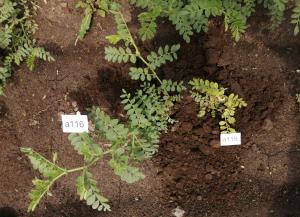
Plant viruses detected in German chickpeas
Plant viruses threaten the superfood in Germany
BRAUNSCHWEIG, GERMANY, February 7, 2025 /EINPresswire.com/ -- A research team led by plant virus expert Dr. Björn Krenz from the Leibniz Institute DSMZ-German Collection of Microorganisms and Cell Cultures GmbH in Braunschweig, Germany has investigated chickpeas grown in Germany for plant virus infections. For the first time, researchers have confirmed that this superfood is infected with various plant viruses. Their findings were recently published in the renowned scientific Journal of Plant Diseases and Protection.
Plant viruses endanger chickpea cultivation
The research team, consisting of experts from the Plant Virus Department at the Leibniz Institute DSMZ, the Julius Kühn Institute (JKI), and the Leibniz Centre for Agricultural Landscape Research (ZALF), conducted a two-year study of various chickpea fields in Saxony-Anhalt and Brandenburg. They discovered, for the first time in Germany, the Pea necrotic yellow dwarf virus (PNYDV) in chickpeas—a virus already known to infect other legumes such as peas, where it can cause significant yield losses. Infected plants exhibited symptoms such as leaf yellowing and stunted growth. Particularly alarming was the high frequency of multiple infections, where plants were affected by several viruses at once. “Our findings suggest that chickpeas in Germany are under substantial infection pressure, especially when grown near pea fields, which can also harbor these viruses. These initial detections highlight the challenges of cultivating chickpeas in Germany,” summarises Dr. Björn Krenz, head of the Plant Virus Department at DSMZ.
The future of chickpea cultivation in Germany
The insights from this study are a crucial step toward developing more resistant chickpea varieties and integrated plant protection strategies. To sustainably meet the growing demand for regionally produced chickpeas, robust plants capable of resisting viral infections are essential. “Our research once again demonstrates how vital collaboration between research institutes such as DSMZ, ZALF, and JKI is in developing practical solutions for agriculture,” concludes plant virologist Björn Krenz. Future research will focus on identifying resistant chickpea varieties and testing alternative cultivation and control strategies. A promising approach could be the targeted breeding of virus-resistant varieties, combined with the use of natural enemies of virus-transmitting insects. Early screening for virus tolerance in breeding programs could help eliminate susceptible varieties at an early stage. Additionally, a systematic virus screening of commercial chickpea varieties would provide farmers with informed selection criteria for more resilient crops. “Given the increasing demand for regionally produced legumes, it will be crucial for policymakers, scientists, and farmers to work closely together to enable sustainable production,” Krenz emphasises. The current research results provide an important foundation for future measures, as healthy plants are the basis of successful agriculture.
Original publication
Kartheuser, C., Tan, S., Bubolz, J., Reckling, M., Menzel, W., Ziebell, H., Krenz, B. (2025) First detection of viral pathogens of chickpea in Germany. J Plant Dis Prot 132:60. https://doi.org/10.1007/s41348-024-01048-z
Press contact:
PhDr. Sven-David Müller, Head of Public Relations, Leibniz Institute DSMZ-German Collection of Microorganisms and Cell Cultures GmbH
Phone: ++49 (0)531/2616-300
Mail: press@dsmz.de
About the Leibniz Institute DSMZ
The Leibniz Institute DSMZ-German Collection of Microorganisms and Cell Cultures is the world's most diverse collection of biological resources (bacteria, archaea, protists, yeasts, fungi, bacteriophages, plant viruses, genomic bacterial DNA as well as human and animal cell lines). Microorganisms and cell cultures are collected, investigated and archived at the DSMZ. As an institution of the Leibniz Association, the DSMZ with its extensive scientific services and biological resources has been a global partner for research, science and industry since 1969. The DSMZ was the first registered collection in Europe (Regulation (EU) No. 511/2014) and is certified according to the quality standard ISO 9001:2015. As a patent depository, it offers the only possibility in Germany to deposit biological material in accordance with the requirements of the Budapest Treaty. In addition to scientific services, research is the second pillar of the DSMZ. The institute, located on the Science Campus Braunschweig-Süd, accommodates more than 89,000 bioresources and has almost 230 employees. www.dsmz.de
The Leibniz Association
The Leibniz Association connects 96 independent research institutions that range in focus from natural, engineering and environmental sciences to economics, spatial and social sciences and the humanities. Leibniz Institutes address issues of social, economic and ecological relevance. They conduct basic and applied research, including in the interdisciplinary Leibniz Research Alliances, maintain scientific infrastructure, and provide research-based services. The Leibniz Association identifies focus areas for knowledge transfer, particularly with the Leibniz research museums. It advises and informs policymakers, science, industry and the general public. Leibniz institutions collaborate intensively with universities – including in the form of Leibniz ScienceCampi – as well as with industry and other partners at home and abroad. They are subject to a transparent, independent evaluation procedure. Because of their importance for the country as a whole, the Leibniz Association Institutes are funded jointly by Germany’s central and regional governments. The Leibniz Institutes employ around 21,300 people, including 12,200 researchers. The financial volume amounts to 2,2 billion euros. www.leibniz-gemeinschaft.de
PhDr. Sven David Mueller, M.Sc.
Leibniz-Institut DSMZ
email us here
Visit us on social media:
Facebook
LinkedIn
YouTube
Distribution channels: Agriculture, Farming & Forestry Industry, Consumer Goods, Food & Beverage Industry, Science, World & Regional
Legal Disclaimer:
EIN Presswire provides this news content "as is" without warranty of any kind. We do not accept any responsibility or liability for the accuracy, content, images, videos, licenses, completeness, legality, or reliability of the information contained in this article. If you have any complaints or copyright issues related to this article, kindly contact the author above.
Submit your press release

